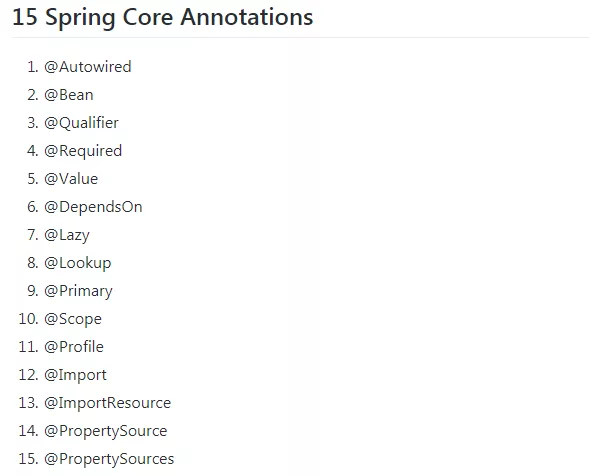15个Spring的核心注释示例
众所周知,Spring DI和Spring IOC是Spring Framework的核心概念。让我们从org.springframework.beans.factory.annotation和org.springframework.context.annotation包中探索一些Spring核心注释。我们经常将这些称为“Spring核心注释”,我们将在本文中对它们进行讲解。
这是所有已知的Spring核心注释的列表。

@Autowired
我们可以使用@Autowired注释来标记Spring将要解析和注入的依赖关系。我们可以将这个注释与构造函数,setter或字段注入一起使用
- 构造器注入
@RestController
public class CustomerController { private CustomerService customerService; @Autowired
public CustomerController(CustomerService customerService) {
this.customerService=customerService;
} } - setter注入
import org.springframework.beans.factory.annotation.Autowired;
import org.springframework.web.bind.annotation.RestController; @RestController
public class CustomerController { private CustomerService customerService; @Autowired
public void setCustomerService(CustomerService customerService) {
this.customerService=customerService;
} } - 领域注入
import org.springframework.beans.factory.annotation.Autowired;
import org.springframework.web.bind.annotation.RestController; @RestController
public class CustomerController { @Autowired
private CustomerService customerService; }
@Bean
- @Bean是方法级注释,是XML元素的直接模拟。 注释支持一些提供的属性,例如init-method,destroy-method,auto-wiring和name。
- 您可以在
@Configuration注解或@Component注解类中使用@Bean批注 - 以下是方法声明的简单示例
import org.springframework.context.annotation.Bean;
import org.springframework.context.annotation.Configuration;
import com.companyname.projectname.customer.CustomerService;
import com.companyname.projectname.order.OrderService; @Configuration
public class Application { @Bean
public CustomerService customerService() {
return new CustomerService();
} @Bean
public OrderService orderService() {
return new OrderService();
} } - 上述配置等效于以下Spring XML:
<beans>
<bean id="customerService"class="com.companyname.projectname.CustomerService"/>
<bean id="orderService" class="com.companyname.projectname.OrderService"/>
</beans>
@Qualifier
此注释有助于微调基于注释的自动布线。 可能存在这样的情况:我们创建多个相同类型的bean,并且只想使用属性连接其中一个bean。 这可以使用@ Qualifier注释以及 @Autowired注释来控制。
示例:考虑使用EmailService和SMSService类来实现单个MessageService接口
- 为多个消息服务实现创建MessageService接口。
public interface MessageService {
public void sendMsg(String message);
} - 接下来,创建实现:EmailService和SMSService。
public class SMSService implements MessageService {
public void sendMsg(String message) {
System.out.println(message);
}
} public class EmailService implements MessageService {
public void sendMsg(Stringmessage) {
System.out.println(message);
}
} - 这时候该看看 @Qualifier注释的用法了
public interface MessageProcessor { public void processMsg(String message); } public class MessageProcessorImpl implements MessageProcessor { private MessageService messageService; // setter based DI
@Autowired
@Qualifier("emailService")
public void setMessageService(MessageService messageService) {
this.messageService=messageService;
} // constructor based DI
@Autowired
public MessageProcessorImpl(@Qualifier("emailService")MessageService messageService) {
this.messageService = messageService;
} public void processMsg(String message) {
messageService.sendMsg( message);
} }
@Required
@Required 注释是一个方法级注释,并应用于bean的setter方法。此注释仅指示必须将setter方法配置为在配置时使用值依赖注入。
例如,对setter方法的 @Required标记了我们想要通过XML填充的依赖项:
@Required
void setColor(String color){
this.color= color;
} <bean class="com.javaguides.spring.Car">
<property name = "color" value="green"/>
</bean>
否则,将抛出BeanInitializationException。
@Value
Spring @Value 注释用于为变量和方法参数指定默认值。我们可以使用@Value 注释来读取Spring环境变量以及系统变量 。Spring @Value 注释也支持SpEL。让我们看一下使用@Value 注释的一些示例 。
示例:我们可以使用@Value 注释为类属性指定默认值 。
@Value("Default DBConfiguration")
private String defaultName;
该 @Value 注释参数可以是只有字符串,但春天尝试将其转换为指定的类型。以下代码将正常工作,并将布尔值和整数值分配给变量。
@Value("true")
private boolean defaultBoolean;
@Value("10")
private int defaultInt;
这演示了Spring @Value - Spring环境变量
@Value("${APP_NAME_NOT_FOUND}")
private String defaultAppName;
接下来,使用 @Value 注释分配系统变量 。
@Value("${java.home}")
private String javaHome;
@Value("${HOME}")
private String homeDir;
Spring @Value – SpEL
@Value("#{systemProperties['java.home']}")
private String javaHome;
@DependsOn
该 @DependsOn 注释可以强制的Spring IoC容器中的bean,它是由注释之前初始化一个或多个bean @DependsOn 注释。
所述 @DependsOn 注释可以在直接或间接地注释与任何类使用 @Component 或与所述注解的方法 @Bean。
示例:让我们创建 FirstBean 和 SecondBean 类。在此示例中, SecondBean 在 bean之前初始化 FirstBean。
public class FirstBean{
@Autowired
private SecondBean secondBean;
}
public class SecondBean
{
public SecondBean()
{
System.out.println("SecondBean Initialized via Constuctor");
}
}
基于配置类在Java中声明上述bean。
@Configuration
public class AppConfig
{
@Bean("firstBean")
@DependsOn(value={"secondBean"})
public FirstBean firstBean()
{
return new FirstBean();
} @Bean("secondBean")
public SecondBean secondBean()
{
return new SecondBean();
}
}
@Lazy
默认情况下,Spring IoC容器在应用程序启动时创建并初始化所有单例bean。我们可以通过使用 @Lazy 注释来防止单例bean的这种预初始化 。
所述 @Lazy 注释可以在任何类中使用,与直接或间接地注释 @Component 或与所述注解的方法 @Bean。
示例:考虑我们有两个bean - FirstBean 和 SecondBean。在此示例中,我们将FirstBean 使用 @Lazy注释显式加载。
public class FirstBean{
public void test()
{
System.out.println("Method of FirstBean Class");
}
}
public class SecondBean{
public void test(){
System.out.println("Method of SecondBean Class");
}
}
基于配置类在Java中声明上述bean。
@Configuration
public class AppConfig { @Lazy( value =true)
@Bean
public FirstBean firstBean() {
return new FirstBean();
} @Bean
public SecondBean secondBean() {
return new SecondBean ();
} }
我们可以看到,bean secondBean 由Spring容器初始化,而bean firstBean 则被显式初始化。
@Lookup
注释的方法 @Lookup 告诉Spring在我们调用它时返回方法返回类型的实例。
@Primary
我们使用 @Primary 当存在多个相同类型的bean时,我们使用它 给bean更高的优先级。
@Component
@Primary
class Car implements Vehicle {} @Component
class Bike implements Vehicle {} @Component
class Driver {
@Autowired
Vehicle vehicle;
} @Component
class Biker {
@Autowired
@Qualifier( "bike")
Vehicle vehicle;
}
@Scope
我们使用@ Scope注释来定义 @Component类的范围或 @Bean定义。 它可以是单例,原型,请求,会话,globalSession或某些自定义范围。 举个例子:
@Component
@Scope(value= ConfigurableBeanFactory.SCOPE_SINGLETON)
public class TwitterMessageService implements MessageService { } @Component
@Scope(value =ConfigurableBeanFactory.SCOPE_PROTOTYPE)
public class TwitterMessageService implements MessageService { }
@Profile
如果我们希望Spring仅在特定配置文件处于活动状态时使用 @Component类或 @Bean方法,我们可以使用 @Profile标记它。 我们可以使用注释的value参数配置配置文件的名称:
@Component
@Profile("sportDay")
class Bike implements Vehicle { }
@Import
该 @Import 注释指示一个或多个 @Configuration类进口。
例如:在基于Java的配置中,Spring提供了 @Import注释,允许从另一个配置类加载 @Bean定义。
@Configuration
public class ConfigA {
@Bean
public A a() {
return new A();
}
} @Configuration
@Import(ConfigA.class)
public class ConfigB {
@Bean
public B b() {
return new B ();
}
}
现在,在实例化上下文时,不需要同时指定ConfigA类和ConfigB类,只需要显式提供ConfigB。
@ImportResource
Spring提供了一个 @ImportResource注释,用于将 applicationContext.xml文件中的bean加载到ApplicationContext中。
例如:考虑我们在类路径上有 applicationContext.xmlSpring bean配置XML文件。
@Configuration
@ImportResource( {"classpath*:applicationContext.xml"})
public class XmlConfiguration { }
@PropertySource
该 @PropertySource 注释提供了一种方便的声明性机制,用于添加 PropertySource Spring的Eenvironment以与@Configuration类一起使用 。
例如,我们从文件config.properties文件中读取数据库配置,并使用Environment 将这些属性值设置为 DataSourceConfig类。
import org.springframework.beans.factory.InitializingBean;
import org.springframework.beans.factory.annotation.Autowired;
import org.springframework.context.annotation.Configuration;
import org.springframework.context.annotation.PropertySource; import org.springframework.core.env.Environment; @Configuration
@PropertySource("classpath:config.properties")
public class ProperySourceDemo implements InitializingBean { @Autowired
Environment env; @Override
public void afterPropertiesSet()throws Exception {
setDatabaseConfig();
} private void setDatabaseConfig() {
DataSourceConfig config = new DataSourceConfig();
config.setDriver( env.getProperty("jdbc.driver"));
config.setUrl(env.getProperty("jdbc.url"));
config.setUsername(env.getProperty("jdbc.username"));
config.setPassword(env.getProperty("jdbc.password"));
System.out.println(config.toString());
} }
@PropertySources
我们可以使用此批注指定多个 @PropertySource配置:
@PropertySources( {
@PropertySource("classpath:config.properties"),
@PropertySource("classpath:db.properties")
})
public class AppConfig {
//...
}
15个Spring的核心注释示例的更多相关文章
- 【SpringBoot】15. Spring Boot核心注解
Spring Boot核心注解 1 @SpringBootApplication 代表是Spring Boot启动的类 2 @SpringBootConfiguration 通过bean对象来获取配置 ...
- spring IOC核心原理
下面来了解一下Spring到底是怎么运行的. public static void main(String[] args) { ApplicationContext context = new Fil ...
- Spring学习总结(六)——Spring整合MyBatis完整示例
为了梳理前面学习的内容<Spring整合MyBatis(Maven+MySQL)一>与<Spring整合MyBatis(Maven+MySQL)二>,做一个完整的示例完成一个简 ...
- Spring集成MyBatis完整示例
该文详细的通过Spring IOC.MyBatis.Servlet.Maven及Spring整合MyBatis的等技术完成一个简单的图书管理功能,实现图书列表.删除.多删除.编辑.新增功能.梳理前面学 ...
- 【转载-好文】使用 Spring 2.5 注释驱动的 IoC 功能
在 IBM Bluemix 云平台上开发并部署您的下一个应用. 开始您的试用 原文链接:https://www.ibm.com/developerworks/cn/java/j-lo-spring25 ...
- JAVA WEB快速入门之通过一个简单的Spring项目了解Spring的核心(AOP、IOC)
接上篇<JAVA WEB快速入门之从编写一个JSP WEB网站了解JSP WEB网站的基本结构.调试.部署>,通过一个简单的JSP WEB网站了解了JAVA WEB相关的知识,比如:Ser ...
- 使用 Spring 2.5 注释驱动的 IoC 功能
概述 注释配置相对于 XML 配置具有很多的优势: 它可以充分利用 Java 的反射机制获取类结构信息,这些信息可以有效减少配置的工作.如使用 JPA 注释配置 ORM 映射时,我们就不需要指定 PO ...
- 使用 Spring 2.5 注释驱动的 IoC 功能(转)
基于注释(Annotation)的配置有越来越流行的趋势,Spring 2.5 顺应这种趋势,提供了完全基于注释配置 Bean.装配 Bean 的功能,您可以使用基于注释的 Spring IoC 替换 ...
- 7 -- Spring的基本用法 -- 3... Spring 的核心机制 : 依赖注入
7.3 Spring 的核心机制 : 依赖注入 Spring 框架的核心功能有两个. Spring容器作为超级大工厂,负责创建.管理所有的Java对象,这些Java对象被称为Bean. Spring容 ...
随机推荐
- Jenkins配置自动化构建
转自: http://blog.sina.com.cn/s/articlelist_3053349671_14_1.html Jenkins 简介和安装(一) (2014-12-02 21:18:13 ...
- HP ALM
HP ALM 使用经验 使用HP ALM(Application Lifecycle Management)软件有一个多月的时间了,我是从安装,部署,建项,配置,使用,再到问题收集,这个过程过来的.发 ...
- uml中活动图与流程图的区别
活动图定义: 活动图是UML用于对系统的动态行为建模的另一种常用工具,它描述活动的顺序,展现从一个活动到另一个活动的控制流.活动图在本质上是一种流程图. 它是UML中用于对系统动态活动建模的图形,反映 ...
- 移植到windows下的iconv
This is a short memo about installing iconv on Windows host (specifically: Windows 7 SP1 x64). Iconv ...
- 纯C++去雾算法
去雾算法 前言:经过不断的改进研究,该算法最终稳定,高效的问世了. 经过研究使该算法适应大雾环境,对该算法的内存优化,可以实时的高效的执行. 一.实时视频: watermark/2/text/aHR0 ...
- ios中coredata
http://blog.csdn.net/q199109106q/article/details/8563438 // // MJViewController.m // 数据存储5-Core Data ...
- 浏览器跨域问题(jsonp)——jsonp详解
json相信大家都用的多,jsonp我就一直没有机会用到,但也经常看到,只知道是“用来跨域的”,一直不知道具体是个什么东西.今天总算搞明白了.下面一步步来搞清楚jsonp是个什么玩意. 同源策略 首先 ...
- 【转】windows平台多线程同步之Mutex的应用
线程组成: 线程的内核对象,操作系统用来管理该线程的数据结构. 线程堆栈,它用于维护线程在执行代码时需要的所有参数和局部变量. 操作系统为每一个运行线程安排一定的CPU时间 —— 时间片.系统通 ...
- ROS学习(十)—— 使用rosed编辑ROS中的文件
一.rosed 1.作用: 直接编辑一个文件而不需要打开完整路径名 2.语法: rosed [package_name] [filename] 3.如果不知道编译哪个文件名,可以使用tab进行查询 r ...
- 面试必备:HashMap源码解析(JDK8)
1 概述 本文将从几个常用方法下手,来阅读HashMap的源码. 按照从构造方法->常用API(增.删.改.查)的顺序来阅读源码,并会讲解阅读方法中涉及的一些变量的意义.了解HashMap的特点 ...
